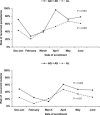Artemisinin combination therapies for treatment of uncomplicated malaria in Uganda
- PMID: 16871329
- PMCID: PMC1488893
- DOI: 10.1371/journal.pctr.0010007
Artemisinin combination therapies for treatment of uncomplicated malaria in Uganda
Abstract
Objectives: To compare the efficacy and safety of artemisinin combination therapies for the treatment of uncomplicated falciparum malaria in Uganda.
Design: Randomized single-blind controlled trial.
Setting: Tororo, Uganda, an area of high-level malaria transmission.
Participants: Children aged one to ten years with confirmed uncomplicated P. falciparum malaria.
Interventions: Amodiaquine + artesunate or artemether-lumefantrine.
Outcome measures: Risks of recurrent symptomatic malaria and recurrent parasitemia at 28 days, unadjusted and adjusted by genotyping to distinguish recrudescences and new infections.
Results: Of 408 participants enrolled, 403 with unadjusted efficacy outcomes were included in the per-protocol analysis. Both treatment regimens were highly efficacious; no recrudescences occurred in patients treated with amodiaquine + artesunate, and only two occurred in those treated with artemether-lumefantrine. However, recurrent malaria due to new infections was common. The unadjusted risk of recurrent symptomatic malaria was significantly lower for participants treated with artemether-lumefantrine than for those treated with amodiaquine + artesunate (27% versus 42%, risk difference 15%, 95% CI 5.9%-24.2%). Similar results were seen for the risk of recurrent parasitemia (51% artemether-lumefantrine versus 66% amodiaquine + artesunate, risk difference 16%, 95% CI 6.2%-25.2%). Amodiaquine + artesunate and artemether-lumefantrine were both well-tolerated. Serious adverse events were uncommon with both regimens.
Conclusions: Amodiaquine + artesunate and artemether-lumefantrine were both highly efficacious for treatment of uncomplicated malaria. However, in this holoendemic area, despite the excellent performance of both regimens in terms of efficacy, many patients experienced recurrent parasitemia due to new infections. Artemether-lumefantrine was superior to amodiaquine + artesunate for prevention of new infections. To maximize the benefit of artemisinin combination therapy in Africa, treatment should be integrated with strategies to prevent malaria transmission. The impact of frequent repeated therapy on the efficacy, safety, and cost-effectiveness of new artemisinin regimens should be further investigated.
Conflict of interest statement
Figures



References
-
- White NJ, Nosten F, Looareesuwan S, Watkins WM, Marsh K, et al. Averting a malaria disaster. Lancet. 1999;353:1965–1967. - PubMed
-
- Winstanley PA, Ward SA, Snow RW. Clinical status and implications of antimalarial drug resistance. Microbes Infect. 2002;4:157–164. - PubMed
-
- Nosten F, van Vugt M, Price R, Luxemburger C, Thway K, et al. Effects of artesunate–mefloquine combination on incidence of Plasmodium falciparum malaria and mefloquine resistance in western Thailand: A prospective study. Lancet. 2000;356:297–302. - PubMed
-
- Price RN, Nosten F, Luxemburger C, ter Kuile FO, Paiphun L, et al. Effects of artemisinin derivatives on malaria transmissibility. Lancet. 1996;347:1654–1658. - PubMed
-
- Bloland PB, Kachur SP, Williams HA. Trends in antimalarial drug deployment in sub-Saharan Africa. J Exp Biol. 2003;206:3761–3769. - PubMed

